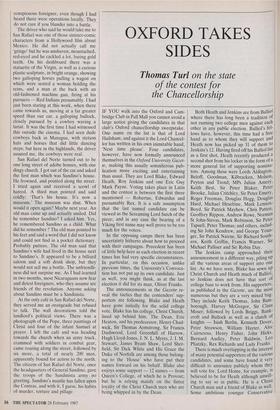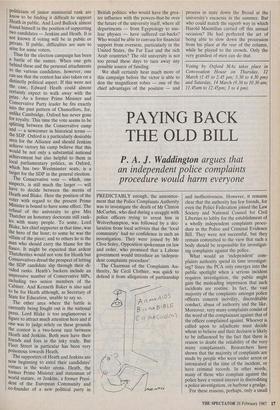OXFORD TAKES SIDES
Thomas Turl on the state of the contest for the Chancellorship
IF YOU walk into the Oxford and Cam- bridge Club in Pall Mall you cannot avoid a large notice giving the candidates in that club's Oxford chancellorship sweepstake. One name on the list is that of Lord Hailsham, and against it the Lord Chancel- lor has written in his own inimitable hand, `Next time please'. Four candidates, however, have now formally announced themselves in the Oxford University Gazet- te, making this usually somniferous pub- lication more exciting and entertaining than usual. They are Lord Blake, Edward Heath, Roy Jenkins and one Eric Guy Mark Payne. Voting takes place in Latin and the contest is between the first three mentioned — Robertus, Edwardus and presumably Rex. It is a safe assumption that the last named candidate can be viewed as the Screaming Lord Sutch of the piece; and in any case the bearing of a Viking first name may well prove to be too much for the voters.
In the opposing camps there has been uncertainty hitherto about how to proceed with their campaigns. Precedent has been of little help here as each election in recent times has had very specific circumstances. In particular, on this occasion, unlike previous times, the University's Convoca- tion has not put up its own candidate. Just as well, you might think, as at the last election it did for its man, Oliver Franks.
The announcements in the Gazette re- veal the tactics that the contenders' sup- porters are following. Blake and Heath have gone initially for the solid college vote. Blake has his college, Christ Church, lined up behind him. The Dean, Eric Heaton, and his predecessor, Henry Chad- wick, Sir Thomas Armstrong, Sir Francis Dashwood, Lord Greenhill of Harrow, Hugh Lloyd-Jones, J. N. L. Myres, J. I. M. Stewart, James Byam Shaw, Lord Sher- field, Sir Dick White and His Grace the Duke of Norfolk are among those belong- ing to the 'House' who have put their names forward on his behalf. Blake also enjoys some support — 12 names — from Queen's College, of which he is Provost; but he is relying mainly on the fierce loyalty of the Christ Church men who are being whipped in by the Dean. Both Heath and Jenkins are from Balliol where there has long been a tradition of not running two college men against each other in any public election. Balliol's fel- lows have, however, this time had a free hand as to whom they will support and Heath now has picked up 31 of them to Jenkins's 12. Having fired off his Balliol list as a first shot, Heath recently produced a second shot from his locker in the form of a • more general list of supporting nomina- tors. Among these were Lords Aldington, Beloff, Goodman, Kilbracken, Molson, Peyton and Trend; MPs Julian Amery, Keith Best, Sir Peter Blaker, Peter Brooke, Julian Critchley, Sir Peter Emery, Roger Freeman, Douglas Hogg, Douglas Hurd, Michael Heseltine, Mark Lennox- Boyd, Sir Patrick Mayhew, Chris Patten, Geoffrey Rippon, Andrew Rowe, Norman St John-Stevas, Mark Robinson, Sir Peter Tapsell, Peter Thomas; and others, includ- ing Sir John Kendrew, and George Youn- ger, Sir Patrick Nairne, Sir Richard South- ern, Keith Griffin, Francis Warner, Sir Michael Palliser and Sir Robin Day. The Jenkins camp approached their announcement in a different way, piling uP all the various areas of support into one list. As we have seen, Blake has sewn 1.1P Christ Church and Heath much of Balliol, so Jenkins does not have that sort of college base to work from. His supporters, as published in the Gazette, are the most numerous but they are a very mixed bag. They include Keith Thomas, John Barn- borough, Harvey McGregor, Sir Claus Moser; followed by Lords Briggs, Bank- croft and Bullock as well as a clutch of knights — Isiah Berlin, Kenneth Dover, Peter Strawson, William Hayter, Alec Cairncross, Henry Fisher, John Hicks, Bernard Audley, Peter Baldwin, Leo Pliatzky, Rex Richards and Lady Franks. There is much overlapping in the interest of many potential supporters of the various candidates, and some have found it very difficult to announce publicly whom they will vote for. Lord Home, for example, is believed to be for Heath although unwill- ing to say so in public. He is a Christ Church man and a friend of Blake as well. Some ambitious younger Conservative politicians of junior ministerial rank are know to be finding it difficult to support Heath in public. And Lord Bullock almost found himself in the position of supporting two candidates — Jenkins and Heath. It is not known if voting will be in public or private. If public, difficulties are sure to arise for some voters.
Thus far the election campaign has been a battle of the names. When one gets behind these and the personal attachments to the various candidates, however, one can see that the contest has also taken on a distinctly political aspect. If this were not the case, Edward Heath could almost certainly expect to walk away with the Prize. As a former Prime Minister and Conservative Party leader he fits exactly into the past pattern of Chancellors, for, unlike Cambridge, Oxford has never gone for royalty. This time the vote seems to be splitting between the Conservative camp and — a newcomer in historical terms the SDP. Oxford is a particularly desirable area for the Alliance and should Jenkins achieve victory his camp believe that this would be not only a substantial national achievement but also helpful to them in local parliamentary politics, as Oxford, which has two Westminster seats, is a target for the SDP in the general election. The Conservative vote — which, one suspects, is still much the larger — will have to decide between the merits of Heath and Blake. Here the position of the voter with regard to the present Prime Minister is bound to have some effect. The refusal of the university to give Mrs Thatcher an honorary doctorate still rank- les with many people. To some, Lord Blake, her chief supporter at that time, was the hero of the hour; to some he was the villain of the piece; and to others he is the man who should carry the blame for the fiasco. It might be expected that ardent Thatcherites would not vote for Heath but Conservatives dread the prospect of letting the SDP candidate slip through their di- vided ranks. Heath's backers include an impressive number of Conservative MPs, including two senior members of the Cabinet. And Kenneth Baker is also said to be for Heath although, as Secretary of State for Education, unable to say so.
The other area where the battle is currently being fought out is the national press. Lord Blake is too unglamorous a figure to attract much attention here and if one was to judge solely on these grounds the contest is a two-horse race between Heath and Jenkins. Both men have their friends and foes in the inky trade. But Fleet Street in particular has been very poisonous towards Heath.
The supporters of Heath and Jenkins are now beginning to extol their candidates' virtues in the wider arena. Heath, the former Prime Minister and statesman of world stature, or Jenkins, a former Presi- dent of the European Community and co-founder of a new political party in British politics: who would have the grea- ter influence with the powers-that-be over the future of the university itself, where all departments — from Egyptology to nuc- lear physics — have suffered cut-backs? Who would be able to canvass for financial support from overseas, particularly in the United States, the Far East and the rich Arab countries? The old university is not too proud these days to turn away any possible source of funding.
We shall certainly hear much more of this campaign before the victor is able to don the magnificent robes — one of the chief advantages of the position — and process in state down the Broad at the university's encaenia in the summer. But who could match the superb way in which Harold Macmillan carried off this annual occasion? He had perfected the art of being able to slow down the procession from his place at the rear of the column, while he played to the crowds. Only the very grandest of men can do that.



















































 Previous page
Previous page